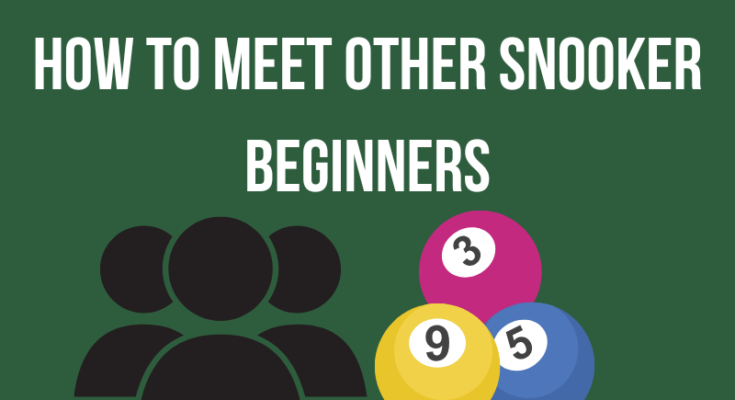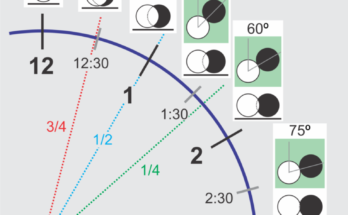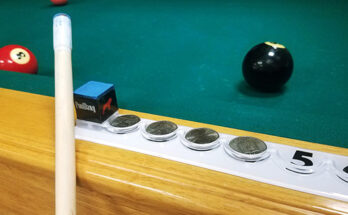How to Meet Other Snooker Beginners
Meeting fellow snooker players is essential for improving your game, building confidence, and truly enjoying this captivating sport. Unlike team sports where social interaction happens automatically, snooker can feel isolating for newcomers who spend hours practicing alone or watching professionals on television without experiencing the community aspect that makes the game so rewarding.
The challenge many beginners face is breaking into what can seem like an exclusive or intimidating environment.
Snooker halls might appear dominated by experienced players, and the sport’s reputation for precision and etiquette can make newcomers hesitant to approach others. However, the snooker community is generally welcoming, supportive, and eager to share knowledge with enthusiastic learners.
Let’s look at practical, tested methods for connecting with snooker players at every level, from complete beginners to seasoned club players. Whether you prefer online communities, local clubs, or informal meetups, these strategies will help you build the connections that enhance both your skills and enjoyment of snooker.
7 Practical Ways to Meet Other Snooker Players & Beginners
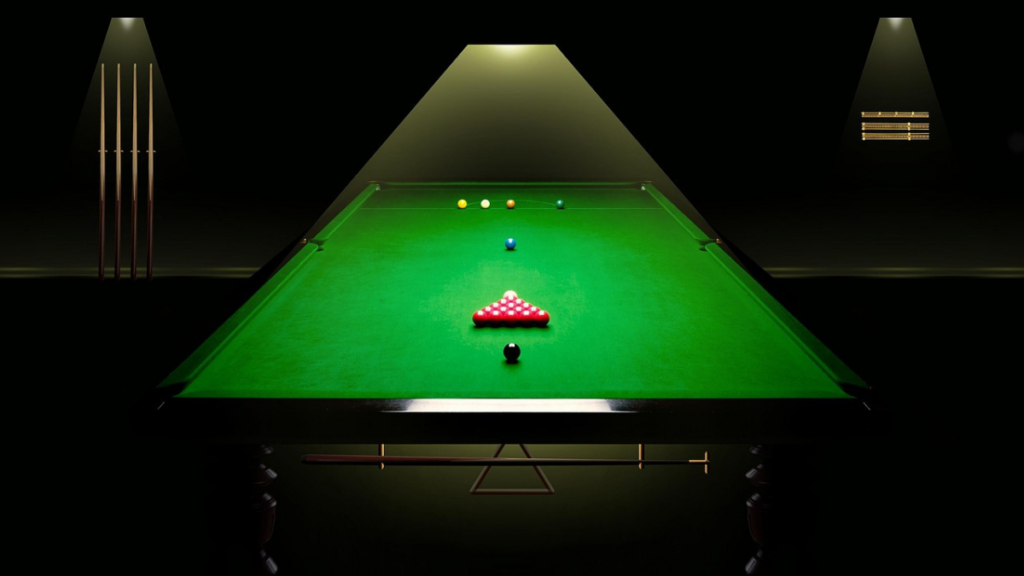
1. Visit Local Snooker Halls Regularly
Regular visits to local snooker halls represent the most direct path to meeting fellow players. Staff and regulars quickly recognize familiar faces, creating natural opportunities for conversation and connections:
- Establish a routine: Visit the same venue consistently, ideally at similar times when you’ll encounter the same group of players
- Engage with staff: Hall managers and counter staff know everyone and can introduce you to players at your level
- Observe before approaching: Watch games to understand the hall’s atmosphere and identify approachable players
- Be patient and persistent: Building relationships takes time, but consistency demonstrates genuine interest
Most snooker halls serve as community hubs with valuable information for connecting with other players:
- Check physical notice boards: Many halls post information about coaching sessions, beginner nights, and informal tournaments
- Ask about regular events: Staff can inform you about weekly leagues, coaching opportunities, or social nights
- Inquire about quiet times: Many halls have designated beginner-friendly periods with less intimidating atmospheres
- Request introductions: Don’t hesitate to ask staff to introduce you to other beginners or welcoming regular players
Most snooker halls have informal meetups or regular groups that welcome newcomers. Introduce yourself to staff first, they’re usually happy to facilitate connections and can suggest the best times for meeting other beginners.
Breaking the ice at snooker halls requires genuine interest and respect for the game:
- Compliment good shots: Acknowledging skill shows appreciation and often leads to friendly conversations
- Ask for advice: Most experienced players enjoy sharing knowledge with enthusiastic learners
- Offer to mark frames: Volunteering to keep score demonstrates engagement and creates interaction opportunities
- Share your learning journey: Being open about your beginner status often attracts helpful mentors
2. Join a Snooker Club or League
Joining established snooker clubs provides immediate access to organized play and built-in social structures:
- Skill-based groupings: Many clubs organize players by ability level, ensuring appropriate competition and learning opportunities
- Regular scheduling: Consistent meeting times create routine social interaction and practice opportunities
- Structured improvement: Clubs often provide coaching, practice sessions, and gradual skill development
- Long-term relationships: Club membership facilitates deeper friendships through shared interests and regular contact
Different organizational structures suit various preferences and skill levels:
- Casual social clubs: Emphasis on enjoyment and friendship rather than competitive play
- Beginner-specific leagues: Organizations designed specifically for new players learning the game
- Mixed-ability clubs: Welcoming environments where experienced players mentor newcomers
- Competitive leagues: More serious organizations for players seeking regular tournament play
Research helps identify clubs that align with your goals and comfort level:
- Visit before joining: Observe club dynamics and ensure the atmosphere matches your preferences
- Ask about beginner support: Inquire about coaching, mentoring programs, or designated beginner sessions
- Understand costs and commitments: Clarify membership fees, required attendance, and competitive expectations
- Seek recommendations: Ask at local halls for suggestions about beginner-friendly club options
3. Take Group Lessons or Coaching Sessions
Professional coaching sessions naturally bring together players at similar skill levels while providing structured learning environments:
- Shared learning experience: Group members face similar challenges and can support each other’s development
- Built-in practice partners: Classmates often continue practicing together outside formal sessions
- Professional facilitation: Qualified coaches can introduce group members and facilitate connections
- Structured progression: Group lessons provide natural conversation topics and shared goals
Various coaching formats offer different social and learning opportunities:
- Beginner group classes: Specifically designed for new players learning fundamental skills together
- Adult education programs: Community college or leisure center courses that attract diverse participants
- Intensive workshops: Weekend or holiday courses that create immersive learning and bonding experiences
- Junior programs: If you have children, youth coaching often includes parent involvement and networking
Group lessons provide numerous chances to connect with fellow learners:
- Arrive early and stay late: Extra time allows for informal conversation and relationship building
- Suggest practice sessions: Propose meeting outside class time to practice skills learned together
- Exchange contact information: Connect with classmates for future practice arrangements or friendly games
- Organize post-lesson activities: Suggest coffee or meals after sessions to deepen friendships
4. Use Online Forums, Social Media, and Apps
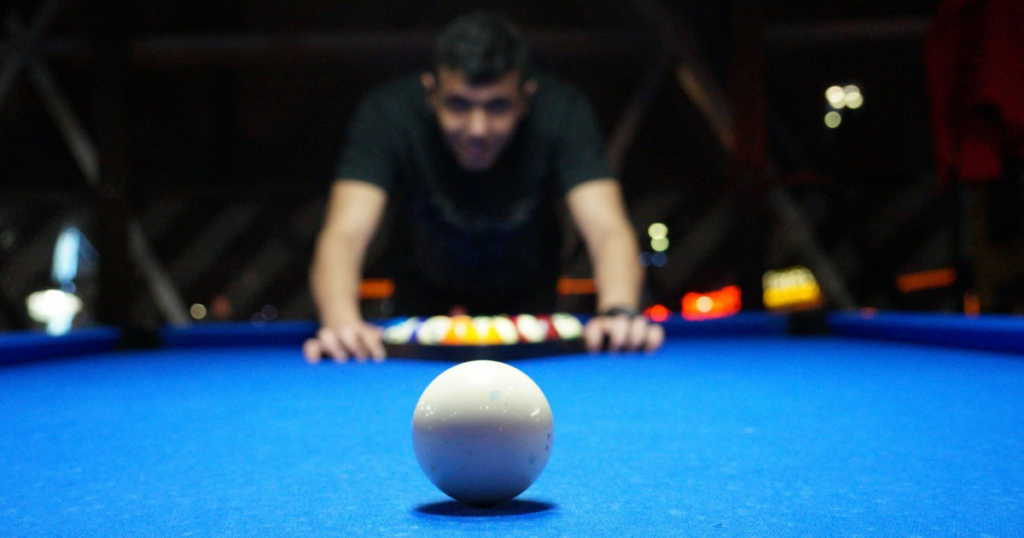
Digital platforms provide access to local and global snooker communities with diverse interests and skill levels:
Facebook Groups:
- Local area groups: Search for “[Your City] Snooker Players” or similar location-specific groups
- Skill-level focused groups: “Beginner Snooker Players,” “Amateur Snooker UK,” etc.
- General communities: “Snooker UK,” “Snooker Fans Worldwide” for broader discussions and connections
- Equipment and advice groups: Communities focused on cues, technique, and improvement tips
Reddit Communities:
- r/snooker: Active community discussing everything from professional tournaments to beginner questions
- r/billiards: Broader cue sports community including snooker discussion and meetup organization
- Local city subreddits: Many cities have active communities where members organize snooker meetups
Specialized Platforms:
- Meetup.com: Search for local snooker and billiards groups in your area
- Cue sports apps: Mobile applications specifically designed for finding local players and organizing games
- Discord servers: Real-time chat communities for snooker enthusiasts and local meetup coordination
Safety and Best Practices: Online connections should always prioritize safety and common sense:
- Meet in public venues: Always arrange first meetings at established snooker halls or public facilities
- Bring a friend initially: Consider having a companion for first meetings with online contacts
- Verify legitimacy: Look for established profiles with genuine snooker interest and local connections
- Trust your instincts: If something feels uncomfortable, prioritize your safety over potential connections
5. Participate in In-House Tournaments or Fun Nights
Friendly tournaments provide excellent opportunities to meet players while enjoying competitive but relaxed snooker:
- Mixed skill levels: Most casual tournaments welcome beginners and use handicap systems for fair play
- Natural conversation starters: Shared tournament experience creates immediate common ground
- Extended interaction time: Tournament formats allow longer interaction periods than casual games
- Celebratory atmosphere: Post-tournament socializing often includes drinks, food, and extended conversation
Even professional snooker players had to start somewhere. Never underestimate the power of performing well at local tournaments and being a fun person to be around.
Various tournament formats accommodate different skill levels and comfort zones:
- Fun nights: Informal competitions emphasizing enjoyment over serious competition
- Handicap tournaments: Systems that level the playing field between different skill levels
- Team events: Partnered competitions that encourage cooperation and mentoring
- Charity fundraisers: Community-oriented events that attract welcoming, socially minded participants
Successful tournament participation requires minimal preparation but maximum openness to new experiences:
- Register early: Show commitment and allow organizers to plan appropriate skill groupings
- Ask about format: Understand the tournament structure, rules, and time commitment before participating
- Bring your own cue: Having familiar equipment reduces anxiety and shows serious interest
- Stay for the entire event: Even if eliminated early, remaining to watch and socialize maximizes networking opportunities
Many beginners hesitate to enter competitions, but most casual tournaments prioritize fun over fierce competition:
- Remember everyone was a beginner once: Experienced players understand the learning process and typically offer encouragement
- Focus on learning rather than winning: Use tournaments as opportunities to observe different playing styles and strategies
- Embrace the social aspect: Treat the event as a social gathering with snooker as the common bond
- Celebrate small victories: Acknowledge good shots, improved technique, or successful social connections
6. Network Through Friends or Work Colleagues

Many professionals discover snooker colleagues through casual conversations about hobbies and interests:
- Lunch break discussions: Sports conversations often reveal fellow snooker enthusiasts among coworkers
- Social event organization: Propose workplace snooker outings or after-work league participation
- Skill sharing: Experienced colleagues may offer coaching or practice partnership opportunities
- Group formation: Organize informal workplace teams for local league participation or casual competition
Friends and family often provide unexpected connections to snooker communities:
- Direct inquiry: Simply ask friends if they know anyone who plays snooker or would be interested in learning
- Social media posts: Share your snooker interest on personal social media to discover unexpected connections
- Party conversations: Discuss your new hobby at social gatherings to identify potential practice partners
- Family connections: Relatives often have diverse social circles that might include snooker players
Sometimes the best approach involves starting your own informal snooker community:
- Organize beginner sessions: Invite friends to try snooker together and learn as a group
- Regular meetups: Establish weekly or monthly snooker outings that gradually attract more participants
- Skill development focus: Frame group activities around mutual improvement rather than competition
- Expand gradually: Allow group members to invite their own friends and contacts to grow the community
7. Volunteer or Watch Local Events
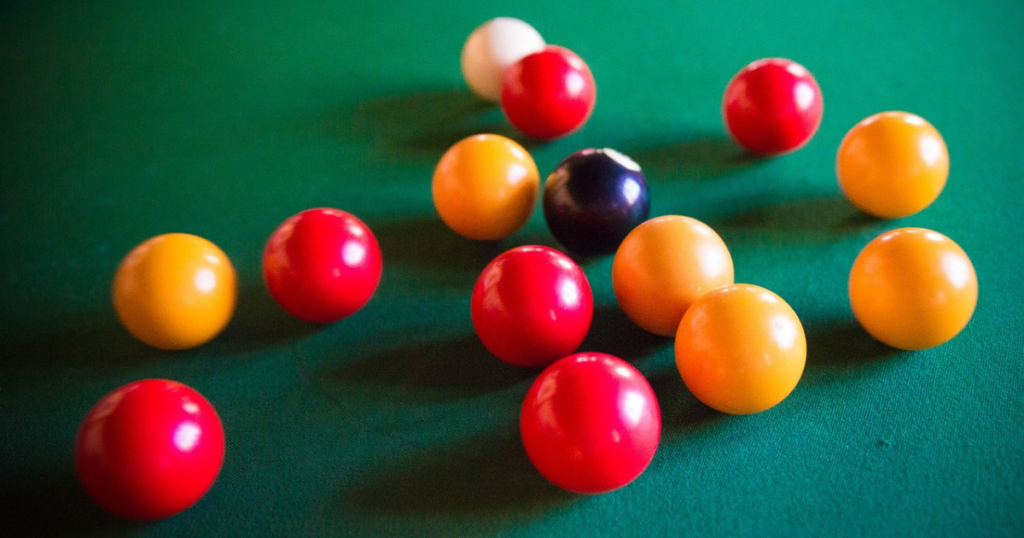
Attending snooker events as an observer provides valuable learning opportunities and natural conversation starters:
- League match observation: Watch local league games to understand competitive play and meet active players
- Tournament attendance: Larger events attract diverse participants and often include social components
- Coaching session observation: Many clubs allow visitors to watch group lessons and meet potential classmates
- Club social events: Attend club parties, prize presentations, or fundraising events to meet members informally
Active participation in events, once you fully understand the snooker rules, demonstrates commitment and creates immediate connections:
- Score keeping: Volunteer to mark frames during competitions to interact closely with players
- Event organization: Help with tournament setup, registration, or refreshments to meet organizers and participants
- Junior coaching assistance: Support youth programs to connect with dedicated community members
- Fundraising activities: Participate in charity events that attract community-minded snooker enthusiasts
Successful event participation requires genuine interest and appropriate social interaction:
- Ask thoughtful questions: Show genuine curiosity about the game, techniques, and local snooker community
- Offer assistance: Volunteer to help with tasks or support event organization when appropriate
- Respect competitive focus: Understand when players need concentration and when they’re available for conversation
- Follow up connections: Exchange contact information with interesting people you meet at events
Where to Find Local Snooker Halls or Clubs
Several authoritative websites provide comprehensive directories of snooker facilities and clubs:
- World Snooker Federation Club Locator: Official international directory with verified club information
- Local council leisure directories: Many city and county websites list public snooker facilities and programs
- Google Maps searches: Search “snooker halls near me” for immediate local results with reviews and contact information
- Specialized snooker websites: Dedicated platforms that maintain current facility information and player reviews
Proper preparation maximizes your chances of positive first experiences:
- Call ahead: Verify opening hours, beginner session availability, and equipment rental options
- Check websites: Look for information about coaching programs, leagues, and social events
- Read reviews: Online reviews often mention atmosphere, beginner friendliness, and community aspects
- Inquire about beginner nights: Many halls designate specific times for new players and coaching
Call ahead or check websites for “beginners’ sessions” or open play nights. Many halls offer designated times when new players feel more comfortable learning and meeting others at similar skill levels.
Understanding typical snooker hall environments reduces anxiety and improves initial experiences:
- Equipment availability: Most halls rent cues and provide balls, though many experienced players bring their own equipment
- Table booking systems: Familiarize yourself with reservation procedures and typical costs for table time
- Etiquette expectations: Basic snooker etiquette includes respecting other games, maintaining appropriate noise levels, and following facility rules
- Payment methods: Understand accepted payment options and typical costs for table rental and equipment use
Frequently Asked Questions (FAQs)
Is snooker welcoming for total beginners?
Absolutely—the snooker community is generally very welcoming to enthusiastic newcomers. Most experienced players remember their own learning journey and enjoy sharing knowledge with genuinely interested beginners. Many snooker halls specifically cater to beginners through designated practice times, coaching sessions, and beginner-friendly leagues that use handicap systems to ensure fair play. The key is approaching with respect and genuine enthusiasm—snooker players appreciate those who show dedication to learning proper technique and etiquette. Most clubs actively seek new members to maintain vibrant communities and ensure the sport’s future, making them eager to welcome committed learners. Start with beginner sessions or coaching programs where you’ll meet others at your level, and don’t hesitate to ask questions—experienced players often become mentors when they see genuine interest and respect for the game.
What should I bring to my first club night?
For your first visit, you need very little equipment—focus on bringing the right attitude and basic preparation. Essential items include: comfortable clothing that allows free movement (avoid loose sleeves that might interfere with shots), proper footwear with non-slip soles, and a positive, respectful attitude toward learning. Most clubs provide house cues for beginners to try, practice balls, and all necessary table equipment, so don’t worry about purchasing gear immediately. Bring a notepad and pen to record tips, techniques, or contact information from helpful players you meet. Have some cash for table fees, drinks, or equipment rental, as many smaller clubs operate on cash basis. Most importantly, bring patience and enthusiasm—learning snooker takes time, but club members appreciate those who show genuine interest in improvement. Consider bringing a friend for moral support if you’re nervous, as many clubs welcome multiple new members and it can make initial conversations easier.
How can I find a female-friendly or youth snooker group?
Many snooker organizations actively promote inclusivity and offer specific programs for women and young players. For female-friendly environments: contact local clubs directly to ask about women’s leagues, ladies’ nights, or mixed social sessions that prioritize welcoming atmospheres. Several organizations promote women’s snooker including the World Women’s Snooker association and local women’s leagues that focus on skill development and social interaction. For youth programs: many clubs run junior coaching sessions, school holiday programs, and age-appropriate leagues that provide safe, supportive learning environments. Community centers and leisure facilities often host more diverse programs than traditional snooker halls, making them good starting points for underrepresented groups. Online communities can help you connect with specific demographic groups—search for “women’s snooker [your area]” or “junior snooker clubs” on social media platforms. Don’t hesitate to contact clubs directly about their inclusivity policies and support for diverse membership—most modern clubs actively work to create welcoming environments for all players.
Should I take lessons or just play with others?
The ideal approach combines both professional instruction and social play for optimal learning and enjoyment. Professional lessons provide: proper technique foundation that prevents bad habits, structured skill development that accelerates improvement, and safety/etiquette education that prepares you for social play. Playing with others offers: practical application of learned skills, exposure to different playing styles and strategies, natural motivation through friendly competition, and social connections that make the game more enjoyable. Recommended sequence: start with a few professional lessons to establish fundamental technique, then combine occasional coaching with regular social play to reinforce skills while building relationships. Group lessons provide the best of both worlds—professional instruction combined with immediate peer connections for future practice partners. Budget considerations: if cost is a factor, prioritize initial professional instruction to establish proper fundamentals, then supplement with social play and occasional tune-up lessons. Many experienced players are excellent informal teachers who can help with technique between formal lessons, making social connections valuable for both skill development and ongoing improvement.
Conclusion
Meeting other snooker players transforms the game from a solitary pursuit into a rich social experience that accelerates learning, builds lasting friendships, and creates opportunities you simply cannot access alone. Whether you choose to visit local halls regularly, join established clubs, participate in group coaching, or connect through online communities, the key is taking that first step beyond practice and into the welcoming world of snooker community.
The beauty of snooker’s social aspect lies in its diversity—you’ll meet people from all walks of life united by shared passion for this challenging and rewarding game. From retired professionals sharing decades of wisdom to enthusiastic beginners discovering the joy of their first successful break, the snooker community offers something valuable for everyone willing to engage respectfully and enthusiastically.
Remember that building connections takes time and consistency. Don’t be discouraged if your first attempts don’t immediately result in deep friendships or perfect practice partnerships. The most successful approach involves trying multiple methods—perhaps combining regular hall visits with online community participation and occasional tournament attendance—until you find the social environments that best match your personality and goals.
Most importantly, approach every interaction with genuine enthusiasm for learning and respect for the game. The snooker community values those who demonstrate commitment to improvement, appreciation for proper etiquette, and willingness to contribute positively to the social atmosphere. Your genuine interest in both the technical and social aspects of snooker will naturally attract like-minded players who become practice partners, mentors, and friends.
Take action today—visit a local hall, join an online community, or inquire about coaching programs in your area. The snooker community is waiting to welcome you, and every expert player you admire started exactly where you are now: enthusiastic, eager to learn, and looking for others who share their passion for this magnificent game.
Continue building your snooker foundation:
- Best Snooker Cues for Beginners for equipment guidance when you’re ready to invest
- How to Break in Snooker for tips on starting games well
Your snooker journey becomes exponentially more rewarding when shared with others—start building those connections today.
